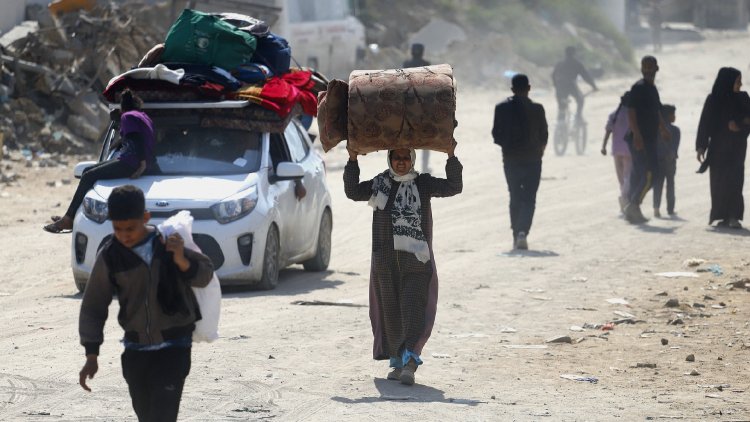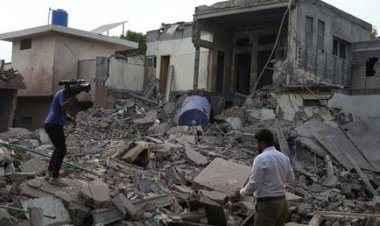Netanyahu States Gaza Ceasefire Discussions Will Proceed 'only under fire'
On Tuesday evening, Hamas declared that it is maintaining ongoing communication with mediators and is engaging in a responsible and positive manner with all initiatives focused on stopping the Israeli "aggression" and ending the blockade on Gaza.

In a televised address, Netanyahu remarked, "We have returned to fighting with full force," further declaring, "From now on, Israel will act against Hamas with increasing intensity." He noted that "Hamas has already felt the weight of our might in the past 24 hours," and added a promise that "this is just the beginning." He emphasized that "we will continue fighting to achieve all the war's objectives, freeing all our hostages, eliminating Hamas, and ensuring that Gaza will no longer pose a threat to Israel," stating, "We are reshaping the Middle East."
Netanyahu explained that the decision to launch the surprise attack overnight was prompted by Hamas's rejection of Israeli and U.S. proposals to extend the initial phase of a Gaza ceasefire deal that expired on March 1. These proposals included extending the ceasefire and securing the release of additional hostages. He argued that "military pressure is a necessary condition for the release of additional hostages," and refuted media claims suggesting that the renewed offensive aimed to ensure his political survival.
On the same day, Israeli Foreign Minister Gideon Sa'ar conveyed that Israel's renewed military actions in Gaza are far from "a one-day operation." Speaking at an event hosted by the American Israel Public Affairs Committee in Jerusalem, he noted that the decision to commence the attacks was established "several days ago." Sa'ar also confirmed that officials from U.S. President Donald Trump's administration were aware of the impending strikes and expressed their support.
The Israeli military reported that about 80 airstrikes were conducted across Gaza within approximately 10 minutes on Tuesday morning, resulting in over 400 fatalities thus far, effectively breaking the fragile ceasefire that had been in place since January 19. According to Niu Xinchun, a professor at the China-Arab Research Institute of Ningxia University, the core motivation behind Israel's military action is to persist in eliminating Hamas, and he anticipates that the conflict in the Red Sea region may expand following this attack.
In response, Hamas announced on Tuesday evening that it is maintaining continuous communication with mediators and is approaching all proposals aimed at ending what it describes as Israeli "aggression" and lifting the blockade on Gaza with a sense of responsibility and positivity. Hamas spokesman Abdul Latif al-Qanou stated that the group has not rejected the proposal from U.S. President Donald Trump's envoy to the Middle East, Steve Witkoff, but has instead responded favorably to it. He accused Netanyahu of reigniting hostilities to undermine the agreement and highlighted that Israel has tightened its blockade, restricting humanitarian aid while avoiding progress on negotiations and escalating the conflict.
After Israel's widespread military action in Gaza, Niu predicted that ceasefire discussions would likely collapse. He asserted that Israel hopes this offensive will compel Hamas to surrender and return to negotiations, potentially agreeing to a transition plan suggested by the U.S. and Israel, although he noted that the likelihood of this occurring is low.
The international community has widely condemned the Israeli airstrikes. Egypt, Kuwait, and Bahrain expressed concerns on Tuesday that the renewed military actions threaten regional peace and stability. These sentiments were echoed during separate phone conversations held by Egyptian President Abdel-Fattah al-Sisi, Emir of Kuwait Sheikh Mishal Al-Ahmad Al-Jaber Al-Sabah, and King of Bahrain Hamad bin Isa Al Khalifa, as conveyed by the Egyptian Presidency through two statements.
Both Sisi and Al-Sabah condemned Israel's resumption of hostilities, which have led to numerous civilian casualties, including children and women, as a "flagrant violation of international law." They emphasized that the Israeli airstrikes indicate attempts to make Gaza uninhabitable and drive Palestinians to flee. The leaders called for the international community to fulfill its responsibilities in advocating for an immediate ceasefire, promoting a two-state solution, and establishing a Palestinian state along the 1967 borders with East Jerusalem as its capital.
Furthermore, the Egyptian president and the king of Bahrain stressed the urgent need for a ceasefire, urging the international community to protect Gazans from the "brutal aggression they are facing." They reiterated the importance of adhering to the resolutions of the recent extraordinary Arab summit held in Cairo, particularly regarding the reconstruction of Gaza.
The United Arab Emirates Foreign Ministry also weighed in, warning that ongoing Israeli airstrikes on civilian and residential areas in Gaza could lead to wider instability in the region. They called for measures to prevent further civilian casualties and deteriorating humanitarian conditions, urging an immediate cessation of hostilities and advocating for the restoration of electricity, reopening of border crossings, and ensuring the delivery of humanitarian aid to those in need in Gaza.
Allen M Lee for TROIB News












